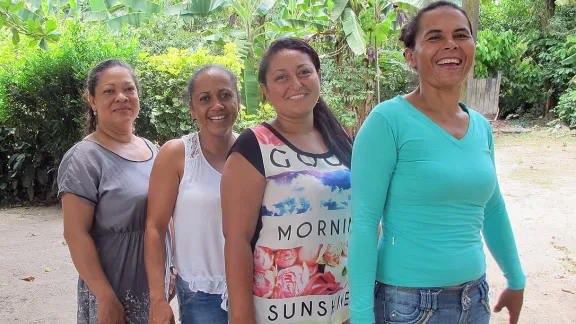
Colombian women have learnt how to demand their human rights, through AMAR. Photo: LWF Colombia
Human Rights Day throws light on abuses in Colombia
(LWI) - "We were left alone with our children. Suddenly we had to be like both parents to them. It was a terrible burden and seemed to be getting worse each day," recalls Yaneth Perez, a leader of the Women’s Association for Arauca (Asociación Amanecer de Mujeres por Arauca, AMAR ), in Colombia.
Mass arrests in early 2000 after the Colombian government publicly accused the people of Arauca and local leaders of having links with the Revolutionary Armed Forces of Colombia (FARC) movement marked a turning point for the inhabitants of the district, especially women.
Reversing traditional roles
Located in eastern Colombia, near the border with Venezuela, Arauca is home to about 250,000 people, including Afro-Colombians, indigenous people and native peasant populations from neighboring towns. Some came to Arauca looking for opportunities, while others fled armed conflict between legal and illegal armed groups that have been dominant in the territory for decades.
The local population struggles to obtain basic services, such as drinking water, education and health. According to a United Nations report in August 2014, the forced recruitment of children, abductions, killings, displacement and extortion are common human rights violations in the department. Antipersonnel mines and unexploded devices pose an additional danger to the local population and humanitarian organizations working in the area.
Learn to work together
Women are especially vulnerable to stigma and abuse by armed actors. With the male members of the family—fathers, brothers, sons and husbands—detained, most women are forced to organize themselves to defend their rights and to support their families.
Thanks to intervention by The Lutheran World Federation (LWF) and its local partner, AMAR, the women of Arauca have turned a situation of helplessness into one of opportunity for community leadership. They work with the LWF in a pineapple cultivation project aimed at generating income and empowering them and their families.
The AMAR women plan to grow more local varieties such as passion fruit, citrus, borojó, arazá, peach palm, avocado, guava and mango to generate more revenue. They want to join other fruit growers in the country and dream of selling fruit and pulp.
“We have work to do”
Since its inception in 1996 the Joel Sierra Human Rights Foundation—a social movement for the rights of farmers—has been advocating for the rights of the rural population to access public services, health and education, and defending them against abuse from armed groups. The organization which started working with the LWF in 2007 is part of the Arauca women’s pineapple cultivation project. .
"Thanks to the support of the LWF we could successfully make visible the problems people face," says Yilson Torres, member of the board of the Joel Sierra Human Rights Foundation. For him, as a social leader and human rights defender, it is important to continue to strengthen the organization in the department, to expand its influence throughout the region and continue working on the promotion, respect and guarantee of human rights to all people, especially peasants, who he believes are often marginalized.
"While there are people who violate their human rights, we have work to do," stresses Torres.
"Not an office job”
Because of the constant violation of human rights, the fact the conflict fails to attract global attention and that the government fails to address the issue, LWF Colombia has stepped in to contributed to the care and protection of people affected by armed conflict.
It is working with the Permanent Committee for the Defense of Human Rights-PCHR East Region on the project "Building Pathways of Peace in our Territory." The initiative seeks to involve the local people in academic and recreational activities, and share information about peace building.
As part of the peace project, the rural population receives training through workshops on human rights, land rights and international humanitarian law so they can demand their rights. These workshops provide opportunities to discuss common issues, generate proposals and in some villages, lead to the establishment of human rights committees.
"It's not an easy job," says Guillermo Diaz, PCHR legal representative in Arauca. "Being a human rights defender is not a desk job. It requires a lot of dedication and sacrifice, but our people deserve that their dignity is respected and that their voices are heard."
Contribution by Nubia Rojas, LWF Colombia


